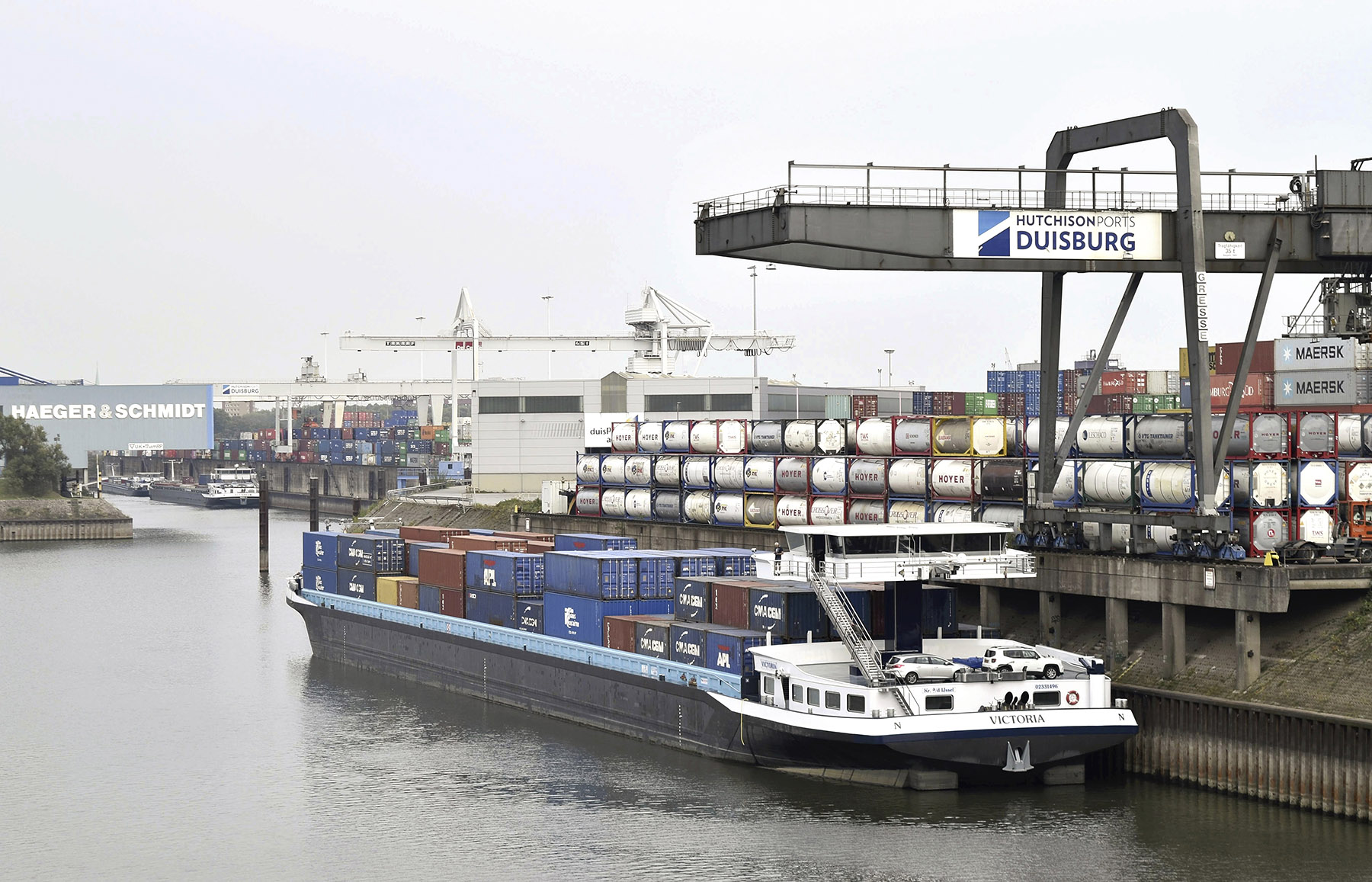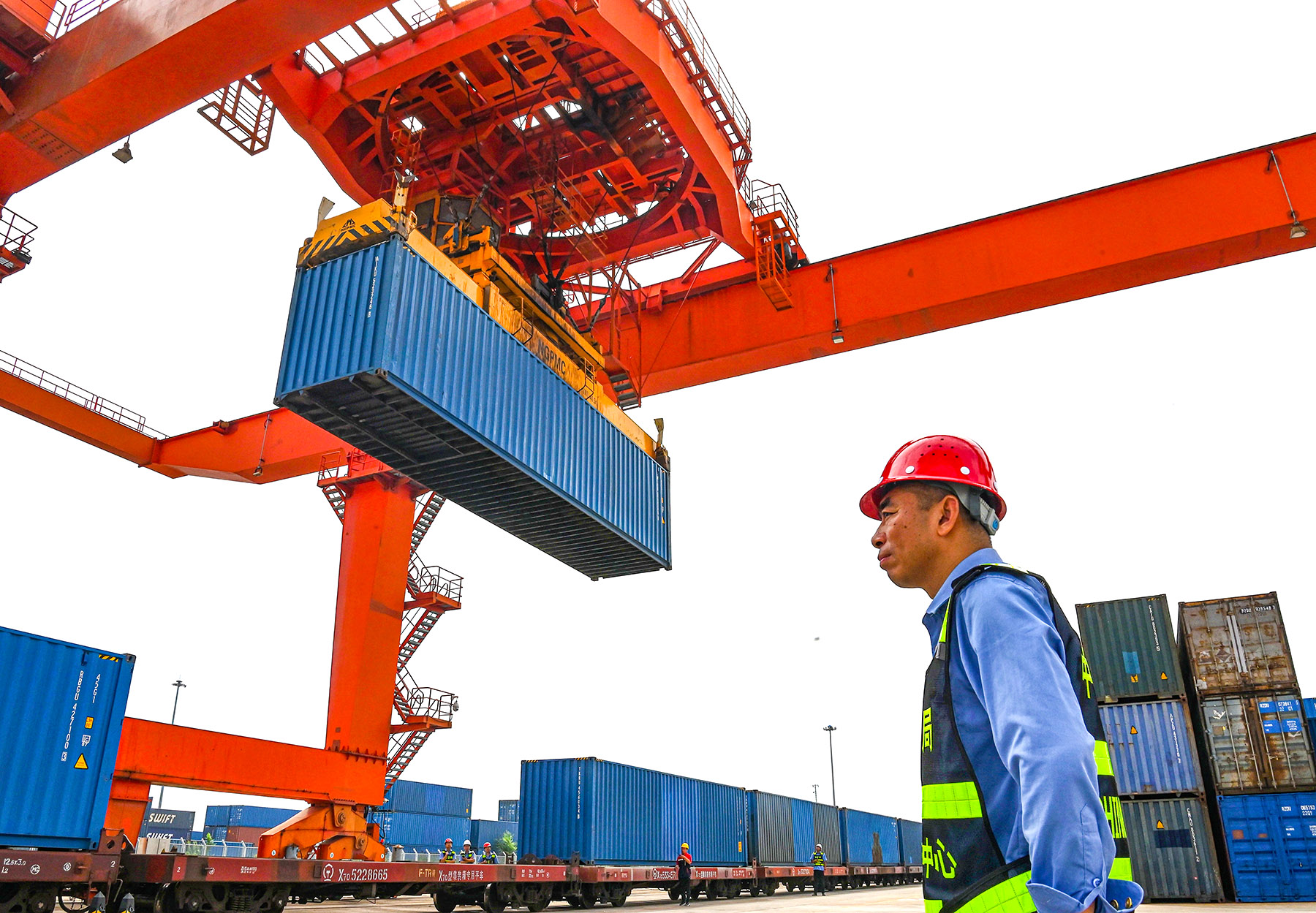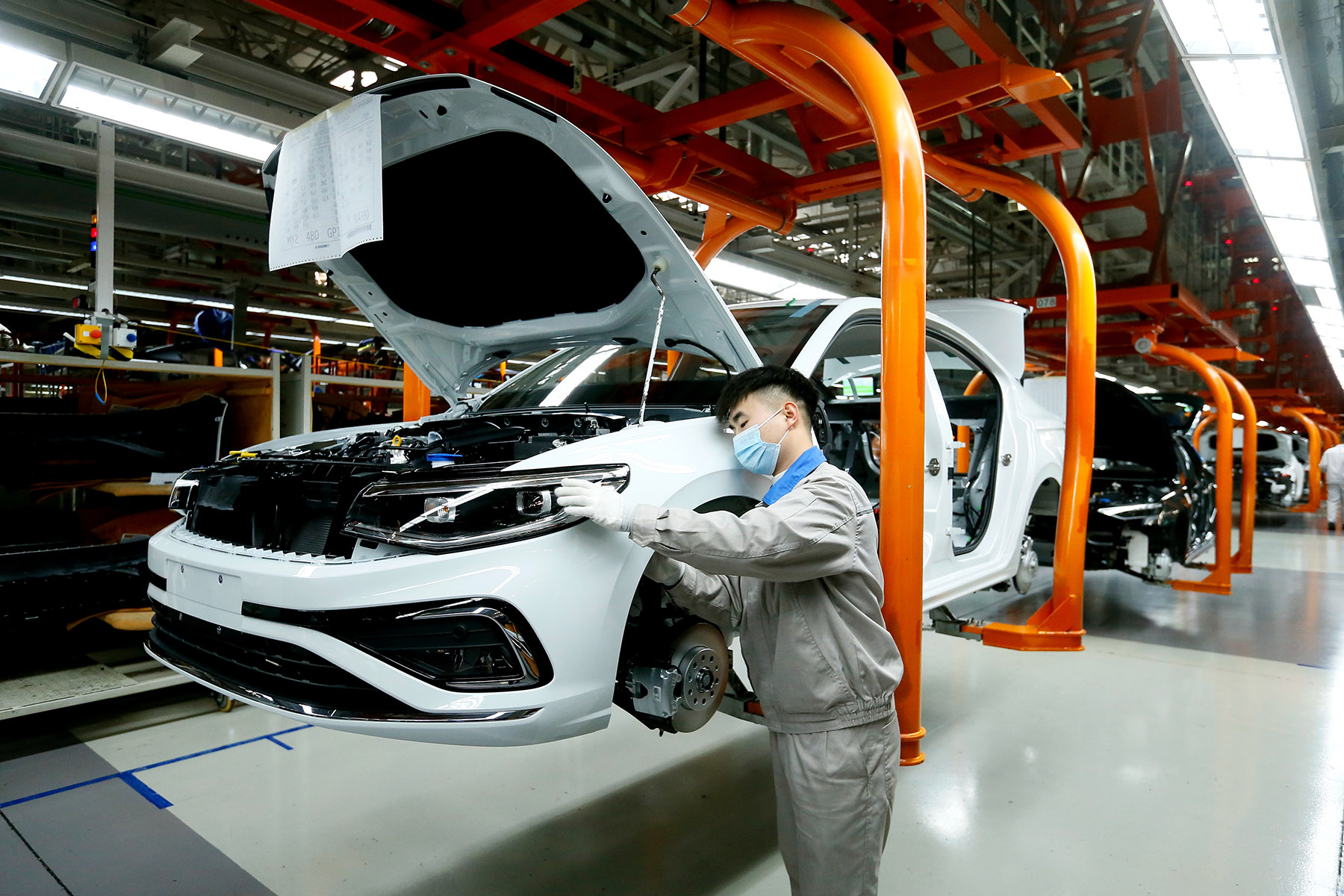Boosting group's competitiveness, managing relationship with Beijing among major issues ahead

When European Commission President Ursula von der Leyen unveiled the next college of commissioners for her second five-year term on Sept 17, she said "the whole college is committed to competitiveness" and "all commissioners must work together".
It came just a day after the abrupt resignation of the powerful French Commissioner for Internal Market Thierry Breton, who openly accused von der Leyen of "questionable governance" and trying to exclude him from the next commission.
Unlike the departure of former executive vice-president Frans Timmermans, who quit a year ago to run for Dutch prime minister, Breton's public display of discontent has been seen by some as embarrassing for von der Leyen, but also described by others as a victory for von der Leyen in her grip on power.
"From queen to empress," read a recent headline of a story on Politico.eu, a digital news site. Several European news outlets have nicknamed the commission president "Queen Ursula" for the past years.
READ MORE: Wang urges EU not to politicize trade issues
Von der Leyen was also humiliated when most of the 27 EU member states defied her instruction a few months ago to submit two candidates — one man and one woman — for her to create a fully gender-balanced team of commissioners. After successfully pressing some smaller member states to swap women for men candidates, she claimed that "we were able to improve the balance to 40 percent women and 60 percent men" in contrast to the original 22 percent women candidates.
The 26 commissioners she announced at a news conference in Strasbourg during the European Parliament plenary session are yet to go through a screening and hearing in the parliament, a process that could go well into November or December. In von der Leyen's first term starting in 2019, three nominees for commissioners failed to win approval from the parliament.
Jasna Plevnik, president of the Geoeconomic Forum Croatia, a think tank, said that EU member states must find a way to halt the growing power of the European Commission leadership over the past five years.
"The role of the executive power has increased, and that shift has challenged the balance of governance within the European Union, the EU's global position, and even worse (it has) put America's strategic and economic interests above the EU's," she said, referring to the public criticism that von der Leyen is "vehemently pro-American".
Just a week before von der Leyen's announcement of the new college, Mario Draghi, the former European Central Bank governor, released a roughly 400-page report on the European Union's future competitiveness. It paints a dismal picture of the bloc in terms of technology, innovation and manufacturing.
The report, ordered by von der Leyen, laments that the EU economy has fallen behind the United States while China is inexorably catching up.
Draghi said the EU faces "an existential challenge" and if it does not change, it will be condemned to "a slow agony".
"The EU is weak in the emerging technologies that will drive future growth. Only four of the world's top 50 tech companies are Europeans," he said.
Since 2008, 30 percent of European "unicorns", or startup companies valued at over $1 billion, have left the bloc for the US, Draghi told reporters at the news conference for the report.
The report calls for closing the innovation gap with the US and China, especially in advanced technologies. It urges improving the bloc's competitiveness through closer cooperation in core areas and massive investment — up to 800 billion euros ($894 billion) annually, in shared objectives.
The report also calls for developing a joint plan to link the goal of decarbonization with increased competitiveness. It warns that the EU must significantly ramp up joint defense spending to reduce its reliance on the US for security.
"The diagnosis is scathing and the medicine is strong," said Sebastien Maillard, associate fellow of the Europe program at Chatham House, a leading think tank based in the United Kingdom, adding that Draghi's strategy does not just come down to money.
"It advocates a new stance toward cooperation by coordinating policies, cutting red tape and better respecting the principle of subsidiarity so that the EU remains focused on areas where it most adds value," he wrote on the Chatham House website.
The report advocates reforming competition law to facilitate mergers of European corporations, referring to the European Commission's ban in 2019 on Siemens' proposed acquisition of Alstom in the high-speed train sector.
While von der Leyen applauded the report as providing guidance for her second term, Friedrich Merz, the leader of the Christian Democratic Union, the largest party in the German parliament, and a strong contender to be the next German chancellor, immediately voiced his opposition to the permanent issuing of EU joint debt featured in the Draghi report.

Domestic issues
"I want to say this very clearly, now and in the future, I will do everything I can to prevent this European Union from spiraling into debt," he told the parliament, or Bundestag, just two days after the release of the Draghi report.
Germany and France, the EU's two largest economies, are busy coping with domestic political and economic crises. German Chancellor Olaf Scholz's coalition government has been greatly weakened in the past year after losing regional elections to not just the Christian Democratic Union, but also the right-wing populist Alternative for Germany party.
The German economy is in poor shape due to high energy costs and low export demand. The Bundesbank predicted that the economy will shrink again in the third quarter of the year, after registering negative growth in two of the past three quarters.
The announcement by Intel CEO Pat Gelsinger on Sept 16 to postpone the construction of a 30-billion-euro chip factory in Magdeburg, Germany, for at least two years, could not come at a worse time for both Berlin and Brussels, which bet on the project injecting confidence in reviving the bloc's advanced microchip manufacturing.
Germany has become a headache for the European Commission and angered neighboring Schengen countries by introducing land border checks for six months starting on Sept 16 in a bid to crack down on illegal migration. The new border controls with France, Luxembourg, the Netherlands, Belgium and Denmark were in addition to the ones introduced earlier with Austria, Switzerland, the Czech Republic and Poland.
Dissatisfaction over the EU's contentious migration policy has been simmering in several other member states, too. The Netherlands has asked for an opt-out of the EU's migration policies. Hungary intends to do the same.
France, the second-largest EU economy, is also mired in a domestic political crisis.
French President Emmanuel Macron, whose allies lost in the European Parliament election in June to far-right parties, named a new government on Sept 21 led by Prime Minister Michel Barnier, a former EU negotiator for Brexit. But opposition politicians from the left quickly announced their plans to undermine the new government with a no-confidence motion in parliament.
Jean-Luc Melenchon, leader of the New Popular Front, which won most seats in the parliament, dismissed the new government as made up of "general election losers".
Jordan Bardella, leader of the National Rally, condemned the composition of the new government and claimed that it is "a return to Macronism" and has "no future whatsoever".
Ding Chun, director of the Center for European Studies at Fudan University, said the major challenges facing the EU are its survival and development.
"The EU is facing many challenges posed by de-globalization, rising populism, resistance to further integration, lack of innovation, an aging population, the Russia-Ukraine conflict, the impact of the US containment policy of China and EU's bid for strategic autonomy," Ding said.
Lai Suetyi, an associate professor at the Center for European Studies at Guangdong University of Foreign Studies, said that von der Leyen's second term, like the first term, will unlikely be an easy one.
Besides the prolonged Russia-Ukraine conflict and the rise of right-wing populism, Lai is worried that the pressure of an economic downturn in the EU and globally could mean fewer resources for the bloc's vital green and digital transitions.
"Nevertheless, the track record of the EU has shown deeper and wider integration upon crises, so I am not pessimistic about it," she said.
The European Parliament elections in June saw the European Greens obtaining only 51 seats, down from the 71 in 2019. The new balance of power suggests that the implementation of a European Green Deal may no longer be a top priority for EU citizens amid the rising cost of living, migration and the prolonged Russia-Ukraine conflict.
While the EU has passed laws to ban the sale of new combustion engine cars by 2035, the European Commission's imposition of provisional tariffs on Chinese EVs, which started in July, is expected to slow down the EU's ambition in green transport transition. The new tariffs on Chinese EVs will hit 35.3 percent on top of the EU's universal 10 percent tariff on all cars.
Chris Aylett, a research associate at the Environment and Society Center of the Chatham House, expressed that imposing tariffs on Chinese EVs will make the EU's low-carbon transition slower and more expensive.

Huge market
"And when it comes to cheap, clean technology, China is the undisputed world leader. Two decades of consistent and targeted industrial policy, combined with the benefits of a huge domestic market, mean that China today produces extremely competitively priced, high-quality, low-carbon goods," he said.
EU member states are divided on the issue, with Scholz recently joining Spanish Prime Minister Pedro Sanchez in calling for the EU to drop its plan to impose extra tariffs on Chinese EVs.
Many are worried about a potential trade war with China launching anti-dumping probes into pork and brandy from the EU.
The two sides have been engaging with each other trying to solve the issues through negotiations. Chinese Minister of Commerce Wang Wentao met with European Commission Executive Vice-President Valdis Dombrovskis in Brussels on Sept 19 in a bid to narrow the differences.
While they have not reached any agreement, both sides reaffirmed their political will to pursue and intensify efforts to find a mutually agreeable solution.
The 27 EU member states will vote on the tariffs. They will be implemented by the end of October unless a qualified majority of 15 members representing 65 percent of the EU population votes against the duties.
"In the field of green and climate, I believe that positive EU-China collaboration will not just benefit China and Europe, but also the world as a whole," said Matic Gajsek, director for Europe at the Europe Asia Center, a Brussels-based think tank.
Ding, of Fudan University, agreed that the green transition, artificial intelligence, digital revolution, joint tackling of global hot spot issues and opposing unilateralism and de-globalization present huge opportunities for China-EU collaborations.
He said the biggest challenges facing the bilateral relations remain to be in trade and the lack of mutual trust.
"Based on the current assessment, the second von der Leyen commission's policy on China won't be too much different," Ding said. But he believes the outcome of the 2024 US presidential election on Nov 5 could impact EU policy direction.
The EU has since March 2019 defined China as a cooperation partner, economic competitor and systemic rival. Some EU politicians have increasingly played up the competition factor and a de-risking strategy. China disagrees with the description and instead emphasizes a comprehensive strategic partnership that was set up between China and the EU in 2003.
Call for dialogue
Lai, of Guangdong University of Foreign Studies, voiced her concern over the excessive emphasis on competition and security in every field, saying it will hurt bilateral cooperation.
"The current pragmatism should be sustained, and dialogue should continue. The two sides should re-discuss how to exit the sanctions against each other so that the strategic partnership could return to the right track," she said, referring to China's counter-sanctions on EU individuals and entities following EU's sanctions on Chinese individuals and entities in March 2021.
The tit-for-tat sanctions have led to a halt in the European Parliament in ratifying the Comprehensive Agreement on Investment that was reached after seven years of hard talks. The deal promises wider market access in China to EU businesses and investors and assures stronger protection for each other's investment.
China and the EU held their 24th summit in Beijing last December. China and the EU also hold regular high-level dialogues on a range of issues from people-to-people exchanges and environment and climate to economy and trade and digital cooperation.
Plevnik, of the Geoeconomic Forum Croatia, believes that the key factor behind EU-China relations remaining relatively healthy is China's persistent willingness to preserve and repair ties and make friends in Europe.
"China has never run a smear campaign against the EU. It has done more than others to help the EU during the COVID-19 pandemic, while its global agenda is multilateral and supportive to developing countries," she said.
She noted that besides relations at the China-EU level, the bilateral relations at the national level have also played a vital role, citing the facts that governments from France, Germany and Italy have recently stepped up diplomatic efforts with Beijing to improve ties.
Plevnik stressed that the upcoming US election will have a "profound effect" on EU-China relations, and for the EU, the health of China-US relations will have a bigger impact on EU-China relations.
ALSO READ: Cooperation between China, Europe called key for future of EV industry
She believes a Kamala Harris administration will most likely continue Joe Biden's policy while a second Donald Trump administration is less likely to press the EU to pivot to the "Indo-Pacific" region, thus helping improve regional stability.
Gajsek, of the Europe Asia Center, believes a Trump victory could reshape EU-China relations.
Given the entire European political establishment views Trump as an unreliable partner, "it may be challenging for them to follow his lead into an escalating Cold War against China", he said.
"This shift could pave the way for more positive EU-China relations."
In an op-ed on Sept 5, Jorg Rocholl, president of the Berlin-based European School of Management and Technology, said the EU should not be looking at the US election outcome "like a rabbit at a snake, hoping for a seemingly favorable result".
"Instead, it must independently and quickly define and work toward its own goals regardless of the result, even more so given its unpredictability," he said.
"Regardless of the US presidential election's outcome, Europe's interests don't fully align with Washington's. It's time to fully recognize this and draw the right conclusion," he said.


